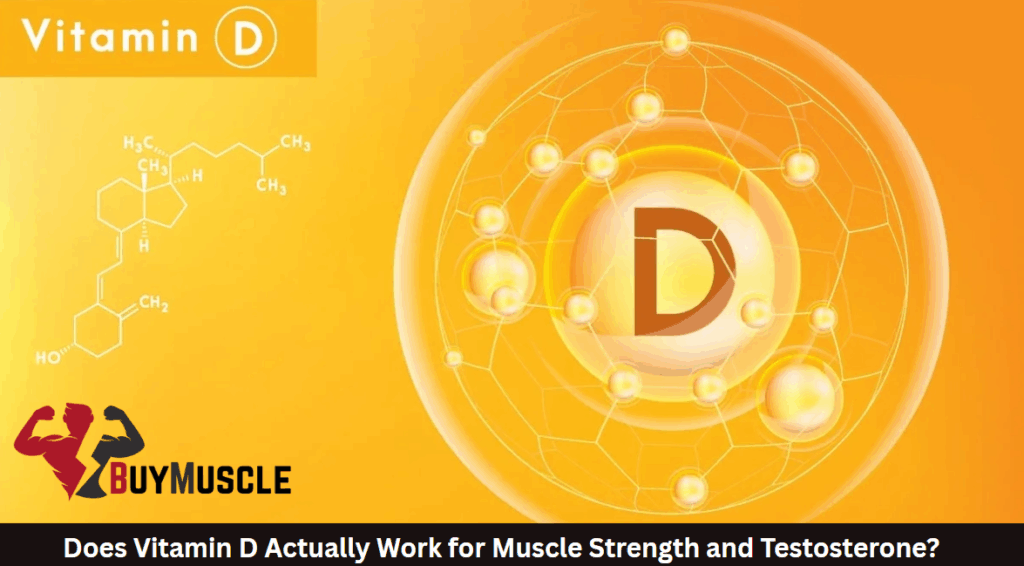If you’re deficient in vitamin D (below 30 ng/ml), supplementing can boost your muscle strength by 10-20% and modestly increase testosterone levels. Your muscles have vitamin D receptors that directly impact force production and recovery time.
D3 supplements work best at 1,000-5,000 IU daily, but won’t help if you already have adequate levels. Most people need year-round supplementation since sunlight and food sources aren’t enough. The real benefits depend on your starting point.
What Does Vitamin D Do in the Body?
Before you pop another vitamin D supplement, hoping for bigger muscles and higher testosterone, you need to understand what this nutrient actually does in your body. Vitamin D isn’t just one compound. It’s D2 (ergocalciferol) from plants and D3 (cholecalciferol) from sunlight and animal sources. D3 is more potent for raising blood levels.
Your body converts vitamin D into calcitriol, its active form, which acts like a hormone. It’s essential for calcium absorption, keeping your bones strong and muscles contracting properly. But here’s where it gets interesting for lifters: vitamin D receptors exist in muscle tissue and testosterone-producing cells.
This nutrient-hormone interaction influences immune and endocrine health, potentially affecting testosterone production and hormone regulation throughout your system. Without adequate levels, you’re compromising multiple pathways vital for performance.

Vitamin D and Muscle Strength
When vitamin D binds to receptors in your muscle tissue, it triggers a cascade of reactions that directly impact your strength and power output. If you’re dealing with vitamin D deficiency, you’ll likely experience reduced muscle strength and slower recovery between workouts.
Research shows that correcting low vitamin D levels can lead to significant muscle strength improvement, especially in your legs and core. You’ll notice better performance during resistance training sessions, with increased force production and reduced fatigue. While vitamin D won’t directly boost testosterone like some claim, it maximizes muscle protein synthesis and reduces inflammation.
For athletes with adequate levels, supplementation won’t provide extra benefits. However, if you’re deficient, restoring ideal vitamin D can enhance muscle recovery and overall training capacity.

Vitamin D and Testosterone Levels
Though vitamin D receptors exist throughout your endocrine system, including in the cells that produce testosterone, the relationship between vitamin D and your hormone levels isn’t as straightforward as many fitness gurus suggest.
Studies show vitamin D3 supplements can modestly increase testosterone levels in deficient men, typically raising total testosterone by 10-20%. However, if you’re already vitamin D sufficient, supplementation benefits for hormones appear minimal.
The most significant improvements occur in older men experiencing both vitamin D deficiency and natural aging and testosterone decline. Research indicates vitamin D may help maintain free testosterone by reducing sex hormone-binding globulin (SHBG), making more testosterone available for use. But don’t expect dramatic hormonal changes unless you’re addressing an actual deficiency.
Signs of Deficiency and Its Impact on Performance
You’ll notice deficiency through persistent fatigue, reduced muscle strength, and frequent injuries that won’t heal. Your athletic performance suffers as power output drops and recovery time increases.
Blood testing reveals the truth. Your serum 25(OH)D levels should exceed 30 ng/mL for basic health, but athletes often need 40-50 ng/mL for peak function. Below 20 ng/mL, you’re clinically deficient and may experience symptoms mimicking hypogonadism, including low testosterone.
Common culprits include indoor training, limited sun exposure, darker skin tones, and northern latitudes. If you’re experiencing unexplained performance declines, testing your vitamin D status should be the priority one.

Should You Supplement with Vitamin D for Strength and Hormones?
How do you know if vitamin D supplementation will actually boost your strength and testosterone? You’ll benefit most if you’re deficient (below 30 ng/ml) or an older adult experiencing age-related decline. Research shows vitamin D activates androgen receptors, potentially increasing bioavailable testosterone in deficient men.
For dosing, start with 1,000-2,000 IU daily if mildly deficient or 5,000 IU for severe deficiency. Don’t exceed 10,000 IU without medical supervision. Pair your vitamin D3 with magnesium and zinc for ideal absorption and hormonal support.
Athletes training indoors, shift workers, and men over 40 typically see the greatest improvements. If your levels are already ideal (40-60 ng/ml), extra supplementation won’t provide additional benefits. Test your blood levels first.
Vitamin D Myths and Misconceptions
When vitamin D gained popularity as a “natural testosterone booster,” supplement companies started making wild claims that didn’t match the science. You won’t see dramatic testosterone spikes if your levels are already normal. Vitamin D only helps when you’re deficient. It’s not a replacement for testosterone replacement therapy (TRT) either. Men with clinically low testosterone need medical intervention, not just vitamins.
You can’t rely on sunlight alone, especially if you live in northern climates or work indoors. Even spending 30 minutes outside won’t guarantee adequate levels.
Fatty fish and egg yolks help, but they’re rarely enough. Most people need supplements to maintain ideal levels year-round. Don’t expect vitamin D to transform you into a muscle-bound beast. It’s a health optimizer, not a miracle drug.
Frequently Asked Questions
Can Vitamin D Supplementation Interfere With Other Medications or Supplements?
Yes, vitamin D can interfere with certain medications. It affects the absorption of thiazide diuretics, digoxin, and calcium channel blockers. You should space it from magnesium supplements and always consult your doctor about interactions.
What Time of Day Should I Take Vitamin D for Best Absorption?
You’ll get the best absorption by taking vitamin D with your largest meal, especially one containing healthy fats. Morning or evening doesn’t matter as much as pairing it with dietary fat to enhance uptake.
Are There Any Side Effects From Taking Too Much Vitamin D?
You can experience toxicity from excessive vitamin D, causing high blood calcium levels. You’ll notice symptoms like nausea, weakness, confusion, and kidney problems. Stick to recommended doses under 4,000 IU daily unless medically supervised.
How Often Should I Retest My Vitamin D Levels After Supplementing?
Retest after 3-4 months of consistent supplementation. It gives your body enough time to build up levels. Once you’ve reached the ideal range, checking annually or twice yearly should be sufficient.
Does Vitamin D Affect Muscle Strength Differently in Women Versus Men?
You’ll see similar muscle strength benefits from vitamin D regardless of gender. While men may experience testosterone changes, women’s strength improvements come through better calcium absorption, reduced inflammation, and enhanced muscle protein synthesis.







